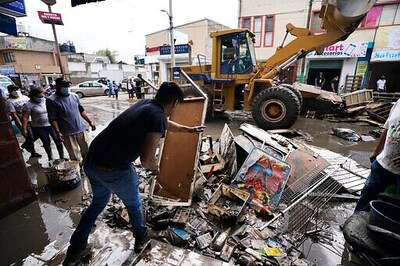
views
Damascus: President Bashar al-Assad, facing the gravest crisis in his 11-year rule, deployed the army in Syria's main port of Latakia for the first time after nearly two weeks of protests spread across the country.
State television showed deserted streets in Latakia littered with rubble and broken glass and burned-out vehicles. Damascus cited attempts by 'armed groups', possibly backed by foreign powers, to stir sectarian conflict across the country.
Dozens have died in pro-democracy demonstrations in the southern city of Deraa and nearby Sanamein as well as Latakia in the northwest, Damascus and other towns over the last week.
Witnesses said major cities appeared calm on Sunday, but several hundred men were holding a sit-in at the Omari Mosque in the town of Deraa, the original focus of protests and scene of a crackdown by security forces last week.
Syrian officials had said Assad, 45, who has made no direct public comment since protests began, was expected to make a television address; but by late Sunday evening he had not appeared.
The dispatch of troops to the streets of Latakia late on Saturday signals growing government alarm about the ability of the security police to maintain order there. Latakia is a potentially volatile mix of Sunni Muslims, Christians and the Alawites who constitute Assad's core support.
Its residential areas house large secret police complexes.
"There is a feeling in Latakia that the presence of disciplined troops is necessary to keep order," one resident told Reuters. "We do not want looting."
Secretary of State Hillary Clinton said the United States deplored the bloodshed in Syria, but that a Libya-style intervention should not be expected.
The unrest in Syria came to a head after police detained more than a dozen schoolchildren for scrawling graffiti inspired by pro-democracy protests across the Arab world.
Such demonstrations would have been unthinkable a couple of months ago in this most tightly controlled of Arab countries, where the Baath Party has been in power for nearly 50 years. Modern Syria gained its independence from France in 1946.
Assad, a British-educated eye doctor, pledged to look into granting greater freedom but this has failed to dampen a protest movement emboldened by uprisings in Egypt and Tunisia.
Assad adviser Bouthaina Shaaban told Al Jazeera television news that the emergency law hated by Syrian reformists for the far-reaching powers it gives to security services would be lifted, but did not give a timetable.
Lawyers say the emergency law has been used by authorities to ban protest, justify arbitrary arrests and closed courts and give free rein to the secret police and security apparatus, which have all severely compromised the rule of law.
Bid to defuse protests
In another step to placate protesters, Syrian authorities released political activist Diana Jawabra, her lawyer said, along with 15 others arrested for taking part in a silent protest demanding the release of children responsible for the graffiti.
This followed news of the freeing of 260 political prisoners.
Assad also faces calls to curb his pervasive security apparatus, free political prisoners and reveal the fate of tens of thousands of dissidents who disappeared in the 1980s.
There have also been protests in Hama, a northern city where in 1982 the forces of President Hafez al-Assad, Bashar's father, killed thousands of people and razed much of the old quarter to put down an armed uprising by the Islamist Muslim Brotherhood.
Middle East analysts do not rule out a harsh crackdown to crush the current demonstrations.
Syria's establishment, including its army, is dominated by members of the minority Alawite sect, an offshoot of Shi'ite Islam to which the Assads belong. This causes resentment among Sunni Muslims who make up some three-quarters of the population.
Latakia is mostly Sunni Muslim but has significant numbers of Alawites.
"An official source said attacks by armed elements on the families and districts of Latakia in the last two days resulted in the martyrdom of 10 security forces and civilians and the killing of two of the armed elements," SANA news agency said.
The source said 200 people, most of whom were from the security forces, had been wounded. Rights activists told Reuters at least six people had been killed in Latakia in two days.
"Decades of pent-up feelings are generating these confrontations. But this is not a mass Sunni-Alawite strife," the Latakia resident told Reuters by telephone. "Cooler heads are prevailing in Latakia."
State of emergency
Deraa is a center of Sunni Muslim tribes who resent power and wealth amassed by the Alawite minority. During protests, a statue of the late Hafez al-Assad, who ruled Syria with an iron fist for 30 years until his death in 2000, was toppled.
There were at least three funerals for those killed in the unrest in villages around Deraa on Sunday, which passed off peacefully with no security in evidence. Mourners in one of the funerals chanted: "The people want the downfall of the regime."
Asked about security forces opening fire in recent days, government spokeswoman Reem Haddad told Al Jazeera on Sunday that, “The security forces were given very strict orders not to shoot at anyone and they did not shoot at anyone at all until those people shot at them and at other citizens.
"Now obviously when you have people shooting then it becomes a matter of national security and you can't just have that happening," she said, adding that she suspected foreign powers were involved in the unrest.
The United States, France and Britain have urged Assad to refrain from violence. A week ago they launched a UN backed air campaign to protect opponents of Libya's Muammar Gaddafi.
Web of conflicts
But analysts see little likelihood of heavily armed Syria, which is part of an anti-Western, anti-Israel alliance with Iran and sits within a web of conflicts across the region, facing the sort of foreign intervention seen in North Africa.
Syria also has links to the Palestinian Islamist militant group Hamas and the Lebanese Shi'ite political and military movement Hezbollah.
Assad was welcomed as the fresh face of reform when he replaced his father, a master of Middle Eastern politics who brooked no dissent at home and made the refusal to bend on the Arab-Israeli conflict the heart of Syrian policy for 30 years.

















Comments
0 comment